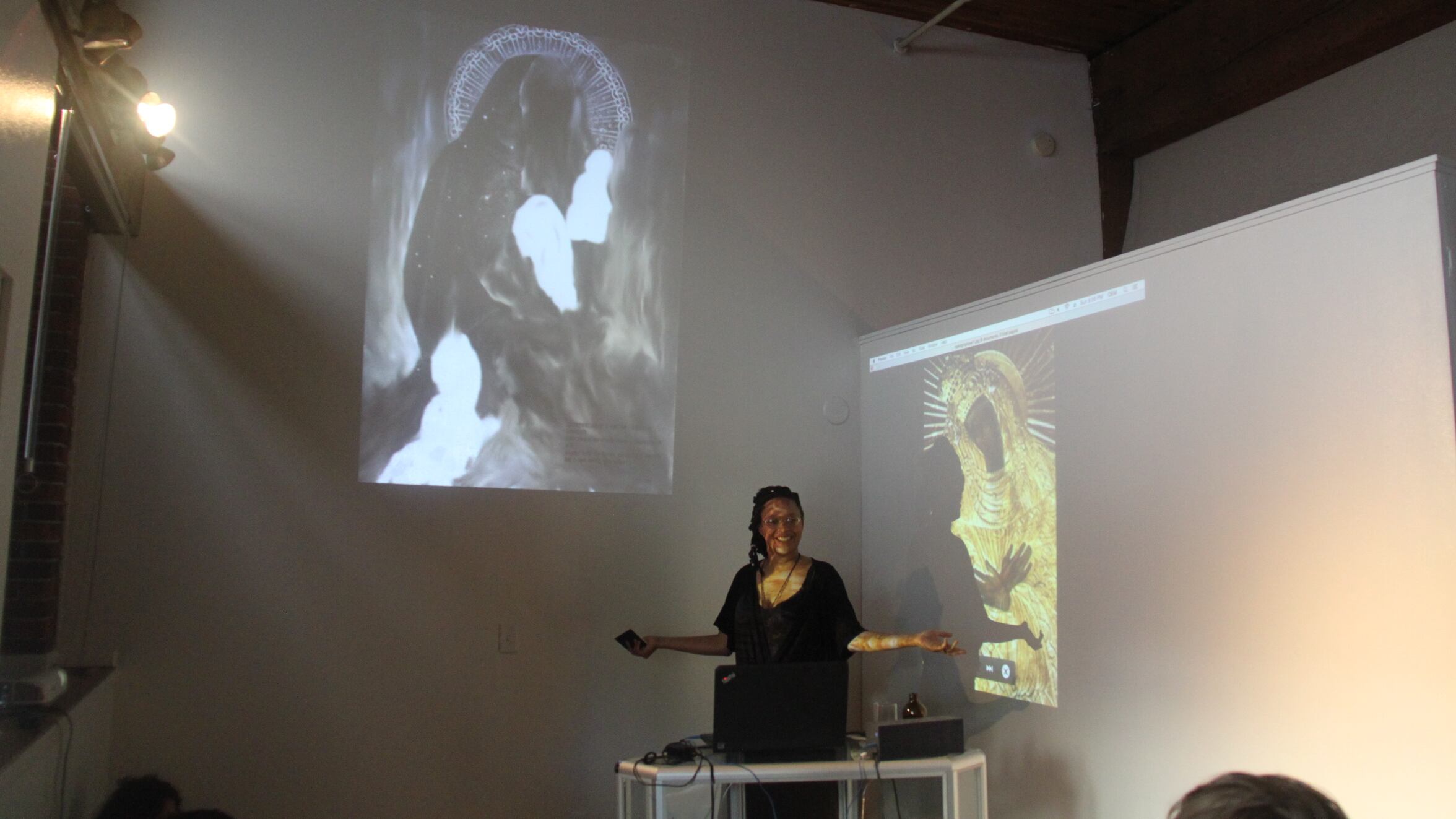Sitting in a sunlit taqueria on Southeast Foster Road, Home School's two founders attempt to distill the goal of their free art school.
"If you simply put it, it's how can we all learn to say, 'Fuck Picasso,'" says Manuel Arturo Abreu, who runs the project with Victoria Anne Reis.
It's tempting to call Home School an anti-art school. The free, pop-up organization hosts art exhibits, guest speakers and classes usually taught by visiting artists Arturo Abreu connected with through social media. There is no homework, tuition, grades or admission applications. Everything Home School does is free, and with few exceptions, its classes and lectures are all posted online.
But calling it an anti-art school would still be defining Home School by the system it hopes to subvert. Reis and Arturo Abreu don't care if their students learn technique, or if they're acquainted with the canon. Instead, they hope to provide an open-ended forum, where artists don't have to abide by the rules or traditions of contemporary art. "It kind of sucks sometimes when you have to make a certain kind of work for a certain kind of audience," Arturo Abreu says. "Your own body and your own life experiences have to be smooshed into that tiny little way."
In addition to artists from around the world, Home School has hosted talks by well-known Portland artists. This year, it hosted two mini festivals called Field Day, that included performances and art by the likes of Nat Turner Project, Amenta Abioto and Keyon Gaskin. Home School is just as concerned about what its students can get out of each class as what its instructors do. "[It's not] that these people need a platform, because some of these people are super-well-established," says Arturo Abreu. "But even someone with a platform might feel suffocated."
Attempting to operate fully outside of the art world is difficult, however. "It's hard to do it with the amount of money we have, which is low," says Arturo Abreu. "But then on the other hand, it's hard to know that everyone is complicit."
Home School was born from both necessity and agency. In 2013, Reis began taking classes at Bruce High Quality Foundation University, a free art school in New York. At the same time, she became pregnant. "Once I had my kid, I couldn't go because I was a single mom," she says.
In 2015, Reis returned to her native Boring, Ore. Once back in Oregon, Reis connected with Arturo Abreu, whom she had met online when they were featured in the same digital exhibit. Almost immediately after meeting in person, the pair decided to found their own school. Before moving to Portland to attend Reed College, Arturo Abreu lived in the Bronx, but had little access to the art world despite living in one of its meccas. Reis and Arturo Abreu decided that, unlike Bruce, their school would make distance learning a priority so anyone could access Home School's resources at any time.
Home School launched in late 2015. Reis and Arturo Abreu both taught classes during the school's first semester. Reis' was called Mom Art. Essentially an antidote to Pop Art's impersonal reproduction, Mom Art drew attention to sentimental, material-based art. "My life as an art student and my life as a mom, they grew together," she says. "I'm not saying that either is better or worse, I'm just saying that Pop Art has a counterpart, and it's Mom Art."
After that, Arturo Abreu taught a class sardonically called "Contemporaneity: building a better white supremacy." One of Artuto Abreu's lectures included a striking sound piece by Queens artist Winslow Laroche called Singing Pill. Laroche created the piece for a previous exhibit using Google Translate. In Singing Pill, a chipper, vaguely feminine voice says: "I never wanted to make a sound piece, but I am honored to be in this show with only black artists for once. It is OK. Sound pieces are in right now. Dat modernism-was-built-off-of-imperialism-and -genocide vibe. People want me to teach for free when I just want to make objects and smoke weed."
Rather than discussing Laroche's artistic influences or contemporaries, Arturo Abreu's lecture traced, among other things, a social history that relates to Singing Pill, like the inherited beliefs that have poured into modern-day white feminism, including racist quotes from suffragettes.
Most of Home School's videos hover around 50 views on YouTube, but they range from none to more than a thousand. Fifty might sound like a low count, but for art school classes, it's a lot. "I get a lot of feedback from random people online," says Arturo Abreu. "We might as well put stuff out there in case someone is out there."
Last weekend, Home School opened an exhibit curated by Hiba Ali, who taught the school's most recent class, "i/c/u: Connection and Control," which tackled compliance and agency in the digital art. Some parts of the class were pragmatic, like workshops on digital software programs Blender and Unity. Others were more conceptual, like reading groups that dealt with web surveillance and reclaiming privacy. The exhibit, which goes by the same name, is currently on view at S1.
Arturo Abreu admits Home School's off-the-grid model comes with plenty of challenges: "It would be nice to have a space. Constant grant income flow would be nice—not having to worry about how to fund a problem."
Still, it's currently the best option they can think of. "If no one's participating," says Arturo Abreu, "The value of the system will fall."
SEE IT: i/c/u: Connection and Control is at S1, 7320 NE Sandy Blvd., homeschoolpdx.tumblr.com. Through Sept. 15.

A Free, Pop-up Art School In Portland Attempts to Exist Outside the Art World
Portland's Queer Opera Experience Strives For Inclusivity In a Traditional Genre
A New Program Provides Screenings In Four Quadrants of Portland For Local Filmmakers

